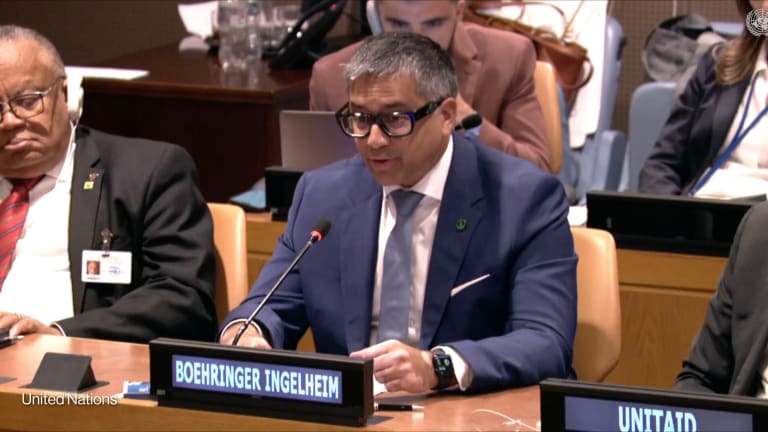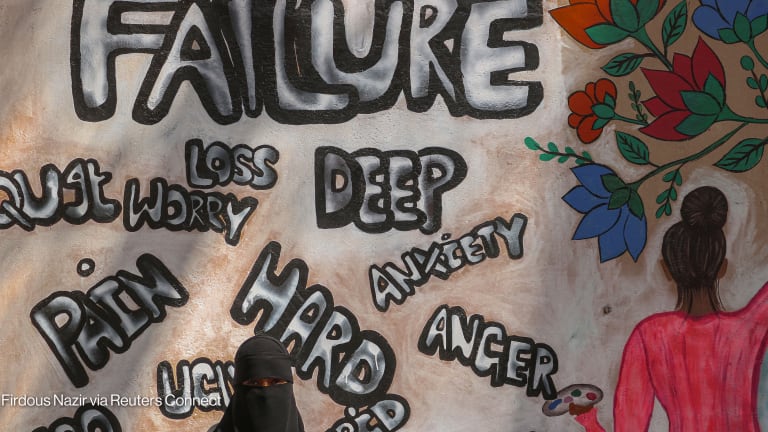
DAVOS, Switzerland — Efforts to improve mental health in lower-income countries received a boost at Davos thanks to £200 million ($260 million) in new research funding and endorsements from high-profile speakers.
The Wellcome Trust, a United Kingdom-based biomedical research charity, announced the new funding Wednesday, saying it aims to revolutionize global research into early intervention treatments for depression and anxiety among young people over the next five years.
“This is a health issue but it’s also a huge economic issue.”
— Jeremy Farrar, director, the Wellcome TrustThe news was welcomed by campaigners, who warn that mental health is an escalating global challenge, especially in low- and middle-income countries where numbers are rising fastest but services lag far behind. According to the World Health Organization, more than three-quarters of people with mental disorders in those countries receive no treatment.
Speaking during a press conference at the 48th annual World Economic Forum meeting in Davos, Switzerland, Jeremy Farrar, director at the Wellcome Trust, said: “There has been great progress in improving awareness over the last few decades but too many people are still left behind. We know too little about the underlying causes, how treatments work, why they work for some and not others, and how to make them more effective.”
More from Davos:
► How collaborative philanthropy efforts are starting to learn from one another
► Y analytics aims to bridge gap between research and impact measurement
► As Davos gathers, the development community struggles for attention
Farrar also described the mental health research sector as “fragmented” and said Wellcome will work to bring together researchers from different fields and geographies to try and create the kind of culture and momentum that helped propel progress on diseases such as cancer and HIV.
Mental health is responsible for 13 percent of the global burden of disease and WEF estimates it will cost the global economy $16 trillion by 2030 in lost productivity and healthcare costs. However, countries spend an average of less than 2 percent of their health budgets on mental health. Furthermore, less than 1 percent of global health aid — approximately $132 million a year — was directed to mental health between 1995-2015.
Low-income countries need to be spending at least 5 percent of their health budgets on mental health and global aid needs to dedicate at least $1 billion a year by 2023, according to Elisha London, CEO of United for Global Mental Health, which aims to make 2019 a pivotal year with its #TimeToAct campaign.
“We are facing an unprecedented challenge ... the world is not equipped to handle the rise in mental health challenges … [and] the vast majority of people have no access to treatment,” she said during the press conference.
London was in Davos to raise awareness about mental health among world leaders and also CEOs, who she said have a major role to play in improving mental health outcomes and removing stigma.
“For too long, global mental health has been significantly overlooked and underfunded … Business have a front and leading role to play both within their organizations and the economies and communities they operate within,” London said.
Getting business leaders on board is especially important in today’s fast-changing work environment, a key concern at this year’s Davos.
“This is a health issue but it’s also a huge economic issue. The workplace environment is changing, and if companies want to attract the best talent and retain it, we all have to produce an environment which is conducive to all of our mental health ... because that will ultimately make us more productive,” Farrar said.
Mental health projects in lower-income countries do not have to be expensive, according to Zimbabwean psychiatrist Dixon Chibanda, who was in Davos to showcase the “Friendship Bench” community project which trains grandmothers to offer problem-solving therapy for people in their communities. The project has been running since 2005 and helped more than 40,000 people receive care last year. The model has now been replicated in Zimbabwe, Malawi, Botswana, Zanzibar, and as far afield as New York City.
However, Chibanda said most mental health spending in low-income countries goes toward psychiatric institutions, which he described as outdated. Instead, scarce resources should go toward simple, cheap and local programs such as the Friendship Bench which can make a huge difference and are more likely to succeed because of their community roots.
Other mental health sessions at Davos featured celebrities and world leaders including the U.K.’s Prince William and the Prime Minister of New Zealand, Jacinda Ardern. Speaking on Wednesday afternoon, Prince William, who has been campaigning around mental health in the U.K., called on world leaders to start tackling mental health now and said stigma was still a barrier to action.
“There is still this stigma attached to mental health that we’ve got to completely obliterate before we can move to the next stage,” he said.








